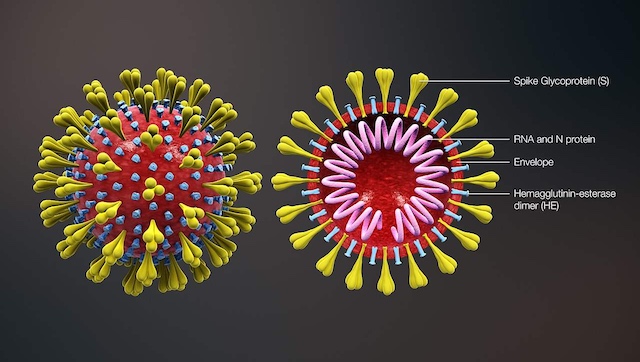A recent study done by a group of researchers at the US Army Medical Research Institute of Infectious Diseases suggests that we can use decoy ACE-2 to keep SARS-CoV-2, the causative agent of COVID-19, from entering host cells. The findings of the study are published in the peer-reviewed journal Science and suggest that these decoy receptors may also be effective against any viral mutants that our neutralising antibodies cannot eliminate. Viruses are intracellular parasites, meaning they need the machinery of our body cells to make copies of themselves. If they fail to do so, they aren’t able to cause any damage. Now, every virus needs specific receptors on the surface of host cells to gain entry into it. For SARS-CoV-2, it is the ACE-2 receptor. Since the receptors are present in various tissues of the body such as eyes, ears, mouth, brain, lungs, kidneys, testicles and heart, the virus can enter through the oral, nasal and eye surfaces and affect all of these areas and organs. Spike protein, ACE2 and treatment of COVID-19 It is the spike protein of the SARS-CoV-2 virus that identifies and interacts with ACE-2. The binding between the two is highly specific and strong as it is the only receptor the virus uses to enter host cells. Now, in a recent study, the researchers have suggested that if we use a soluble form of ACE-2, the virus would bind as strongly with it as it would with an ACE2 present on host cells. It has previously been suggested that a lot of variants of neutralising antibodies have been shown to form against the coronavirus however, the latter always mutates to save itself from these antibodies. Since ACE-2 is crucial for the survival of the virus inside the body, it can’t change its affinity for soluble ACE-2 because then it won’t be able to infect our cells either. This would, in turn, reduce the virulence (ability to infect). On the other hand, ACE-2 has not yet evolved enough to be able to recognise the spike protein of SARS-CoV-2 by itself. However, the researchers created a library of various variants of ACE2 in the body that may have a strong or weak bonding with the spike protein. Out of the library, a single strong binding variant called sACE2 was suggested to be effective in keeping the virus from binding to host cells. Not the only study sACE2 has already been shown to be safe for those with lung disease and non-harmful for human cells. The variants are being tested in phase 2 trials in Europe by Apeiron Biologics. The trials that started in April are still recruiting patients (currently set to enrol 200 volunteers). The participants will be COVID-19 patients between the age of 18 and 80 years and will get either the recombinant sACE2 or a placebo intravenously twice daily. The study is estimated to be complete by November 2020. A study done by scientists at the Karolinska Institutet in Sweden and the University of British Columbia (UBC) in Canada has shown that sACE2 can reduce the presence of SARS-CoV-2 inside vero cells by a factor of 1000-5000. In other words, it can stop the virus from entering the cells. This study also included researchers from Apeiron Biologics. “We believe adding this enzyme copy, hrsACE2, lures the virus to attach itself to the copy instead of the actual cells… It distracts the virus from infecting the cells to the same degree and should lead to a reduction in the growth of the virus in the lungs and other organs.” Ali Mirazimi, one of the corresponding authors of the Karolinska study had said in a news release. For more information on ACE2 receptors, read our article on Why coronavirus affects the lungs Health articles in Firstpost are written by myUpchar.com, India’s first and biggest resource for verified medical information. At myUpchar, researchers and journalists work with doctors to bring you information on all things health.
Decoy ACE2 proteins can be used to prevent COVID-19 causing virus from entering host cells, claims US study
Myupchar
• August 5, 2020, 20:28:18 IST
Viruses are intracellular parasites, meaning they need the machinery of our body cells to make copies of themselves.
Advertisement
)
End of Article